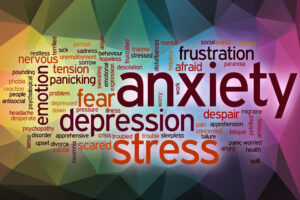Anxiety Counseling
In today’s world, information is increasingly abundant; experiencing mild anxiety is normal; however, when fear is present anxiety soars…
Anxiety, fear and worry are in the house; uninvited, without a warning notice. With these unanswerable questions my heart is pounding, my chest tightens, there’s cold sweats, cloudy thinking and breathing is such a strain. Moving forward seems hopeless, riding this storm out has become my only alternative…”
But, there is hope… If you are sick and tired of being sick and tired… then you are ready to make some healthy changes. Simply Grace Counseling in Alpharetta can help you make those healthy changes.
“Anxiety or worry is the fuel for a continuous stream of negative thoughts and the only way out is to allow it to wear us down into the pit of exhaustion. On the other side of exhaustion is a slow, shaky, temporary reset. Anxiety becomes even more dominate when we fear the idea of anxiety. It can attack at a moment’s notice and at a most inopportune time.”
Kenneth Pallone
Psychologists today have many classifications of Anxiety. Anxiety disorders include:
Obsessive-Compulsive Disorder
Acute Stress Disorder
Post-Traumatic Stress Disorder
Generalized Anxiety Disorder
Social Phobia Panic Disorder
For more information about these disorders please visit The National Institute of Mental Health.
Generalized Anxiety Disorder (GAD)
A mental condition characterized by excessive or unrealistic anxiety about two or more aspects of life (work, social relationships, financial matters, etc.), accompanied by various symptoms.
Generalized Anxiety Disorder may include symptoms such as:
Increased muscle tension
Pain
Impaired concentration
Irritability
Insomnia
Note: “Extreme worrying almost every day for six months or more may signify generalized anxiety disorder.” a common trait or symptom, NIMH
Panic Disorder
If someone is experiencing Panic Disorder, there is almost always an unresolved trauma or series of traumas lurking in their past. The trauma(s) and its significance needs to be dealt with in a meaningful way; a way that brings perceived closure to the person, in order to move forward with peace, safety and enjoyment of life.
“Panic disorder is an anxiety disorder characterized by regular and sudden panic attacks. It is normal to feel anxious and panic in response to stressful or dangerous stimuli and situations, but for people with panic disorder, the panic attacks occur regularly and at any time, often without any obvious trigger.”
Mental Health Foundation
Obsessive Compulsive Disorder (OCD)
People with OCD have obsessive thoughts and/or compulsive behaviors. Obsessive thoughts are usually undesirable, intrusive, and uncontrollable. Compulsions are repetitive behaviors or mental expressions done in an attempt to create predictability or normalcy.
People with OCD desire (long for) peace and safety. It is obvious to them that their obsessions or compulsions are excessive, unreasonable and are interfering with everyday life.
Post-Traumatic Stress Disorder (PTSD)
Someone with PTSD has been exposed to or experienced a traumatic or series of traumatic events. Their response(s) (at that time) may have been overwhelming fear, helplessness, and/or paralyzing shock.
For Example: A person is presently 25 years old and experienced a life altering trauma at age 10. The trauma has remained unresolved. This person could experience a wide variety of symptoms such as: recurring and intrusive trauma thoughts; distressing dreams or flashbacks; distress at exposure to trauma cues; avoidance of trauma reminders or memory lapses.
They may also experience feelings of detachment from others; a sense of loss or hopelessness for the future; difficulty falling or staying asleep; being easily startled or “jumpy”; anger or irritability; difficulty concentrating or emotional “numbness” (especially toward close family). The above are symptoms of the trauma. One might ask, “Why do I feel so conflicted?” Conflict between our conscious and subconscious minds can be a source of much anxiety (doublemindedness). What are some of your deep core issues that need a resolution? If you need answers, Simply Grace Counseling in Alpharetta can help.
Phobias or Persistent Fears
A phobia is a marked and persistent fear that is excessive or unreasonable. Unreasonable or excessive fear can be triggered by the presence of an object or the idea of being put in a specific situation. Examples include: Fear of heights, dogs, closed spaces, social settings, embarrassment, failure or even fear of success. The person sees the fear as unreasonable, but feels powerless to control their anxious anticipation, even before they enter the situation. Their tendency is to avoid the feared object or situation.
If you or someone you know struggles with excessive fear or anxiety, there is good news…help is available! Simply Grace offers a holistic alternative. We have seen amazing results with our programs. Give us a call today.
Simply Grace Counseling in Alpharetta, GA can help you with anxiety. Our counseling for anxiety can help you to achieve the following goals:
 Make peace within yourself
Make peace within yourself
Stabilize your moods
Learn healthy coping skills
Calm obsessive negative thoughts
Feel better about past, present and future self
Less stress
Objective communication within and with others
Personal growth
More freedom from the control of others
Opportunity for better decisions

